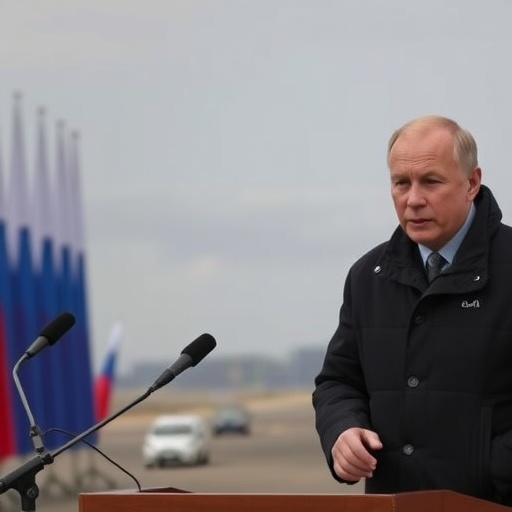Zelensky Pushes for Sweeping US Sanctions on Russian Oil to Starve Putin’s War Effort
In a bold and urgent plea amid the escalating conflict in Ukraine, President Volodymyr Zelensky has implored the United States to intensify its economic pressure on Russia by expanding sanctions to encompass the entirety of the Russian oil sector. This call comes as Ukraine battles to survive Russia’s unprovoked invasion, now in its third year, with Zelensky arguing that targeted measures against individual companies are insufficient to halt Moscow’s aggression.
- Zelensky’s Stark Warning: Oil Sanctions as a Weapon Against Invasion
- Russia’s Oil Empire Under Siege: How Sanctions Have Evolved
- Global Ripple Effects: Balancing Pressure on Russia with Energy Stability
- U.S. Policymakers Grapple with Zelensky’s Call Amid Bipartisan Tensions
- Path Forward: Sanctions Expansion and the Quest for Peace in Ukraine
Zelensky’s address, delivered virtually to a gathering of international policymakers in Washington, D.C., underscored the critical role of Russia’s fossil fuel revenues in funding its military operations. “The oil that flows from Russia isn’t just energy—it’s the lifeblood of their war machine,” Zelensky stated, his voice resolute despite the visible toll of the conflict. He emphasized that broadening sanctions would not only weaken Russia’s economy but also signal unwavering global resolve against the Kremlin’s imperial ambitions.
This appeal arrives at a pivotal moment. As of late 2023, Russia continues to export millions of barrels of oil daily, generating an estimated $180 billion in revenue annually from energy sales, according to data from the International Energy Agency (IEA). Much of this income has been funneled into the war effort, including the procurement of advanced weaponry and the bolstering of troops along Ukraine’s eastern frontlines. Zelensky’s push for comprehensive sanctions reflects a strategic escalation in Ukraine’s diplomatic offensive, aiming to leverage Western unity to force a cessation of hostilities.
Zelensky’s Stark Warning: Oil Sanctions as a Weapon Against Invasion
President Zelensky’s rhetoric has grown increasingly pointed in recent months, framing the sanctions debate as a moral imperative. In his latest statement, he detailed how Russia’s oil exports have sustained an economy battered by prior Western restrictions. “We’ve seen sanctions on specific oligarchs and firms, but Russia adapts, rerouting oil through shadow fleets and third-party nations,” Zelensky remarked during a press briefing following his U.S. appeal. This adaptability, he argued, necessitates a sector-wide clampdown to prevent evasion.
Historical context bolsters Zelensky’s case. Since the full-scale invasion began in February 2022, the U.S. and its allies have imposed a series of sanctions aimed at curbing Russia’s energy dominance. These include a ban on Russian oil imports to the U.S. in March 2022 and a $60 per barrel price cap on Russian crude enforced by the G7 nations starting in December of that year. Yet, as per a recent report from the Center for Research on Energy and Clean Air (CREA), Russia has maintained oil export volumes at around 7.5 million barrels per day, largely by pivoting sales to China and India, which now account for over 80% of its seaborne oil shipments.
Zelensky highlighted the human cost of this resilience. “Every barrel of Russian oil sold funds missiles that strike Ukrainian cities, killing civilians and destroying homes,” he said, invoking vivid images from recent drone attacks on Kyiv and Kharkiv. His plea resonates emotionally, drawing parallels to World War II-era embargoes that starved aggressor economies. Experts like Dr. Fiona Hill, a former U.S. National Security Council official, have echoed this sentiment, noting in a CNN interview that “targeted sanctions have been like poking holes in a dam—expansive measures could finally breach it.”
Russia’s Oil Empire Under Siege: How Sanctions Have Evolved
The evolution of sanctions against Russia paints a picture of incremental but impactful Western resolve. Initially focused on financial institutions and technology exports post-Crimea’s annexation in 2014, measures intensified dramatically after the 2022 invasion. The U.S. Treasury Department’s Office of Foreign Assets Control (OFAC) has designated over 1,200 Russian entities and individuals, including key players in the energy sector like Rosneft and Gazprom Neft.
Despite these efforts, Russia’s oil sector remains a fortress. In 2023 alone, Moscow earned approximately $218 billion from fossil fuel exports, per Ukrainian intelligence estimates cited by Zelensky. This windfall has enabled Russia to increase military spending by 25% year-over-year, reaching $109 billion in 2024 projections from the Stockholm International Peace Research Institute (SIPRI). Sanctions have bitten, however—Russia’s GDP contracted by 2.1% in 2022, and oil production dipped slightly to 10.5 million barrels per day, according to the IEA.
Zelensky’s call for expansion targets loopholes exploited by Russia. For instance, the use of a “shadow fleet” of uninsured tankers—over 600 vessels as of mid-2024, per Lloyd’s List—allows oil to be shipped covertly, often with transshipments in international waters to obscure origins. Additionally, refined products like diesel are sold to Europe via intermediaries in Turkey and the UAE, bypassing direct bans. “We must sanction the entire chain, from wells to wheels,” Zelensky urged, proposing measures like secondary sanctions on complicit foreign banks and insurers.
International allies have shown mixed progress. The European Union phased out Russian oil imports by sea in 2022 but still relies on pipelines for 1 million barrels daily. Meanwhile, China’s purchase of discounted Russian crude—up 24% in 2023 to 2.1 million barrels per day—has cushioned Moscow’s losses. Zelensky’s advocacy seeks to rally the U.S. Congress, where bipartisan support for Ukraine aid has wavered amid domestic debates over inflation and border security.
Global Ripple Effects: Balancing Pressure on Russia with Energy Stability
Expanding U.S. sanctions on Russian oil carries profound implications for the global energy landscape. Proponents, including Zelensky, argue that the move would accelerate Russia’s economic isolation without causing catastrophic disruptions, given the U.S.’s surge in domestic production to 13.3 million barrels per day in 2023, per the Energy Information Administration (EIA).
However, critics warn of volatility. Oil prices spiked to $123 per barrel in March 2022 following the invasion, contributing to global inflation rates that peaked at 9.1% in the U.S. A broader sanctions regime could push Brent crude toward $100 again, analysts at Goldman Sachs predict, potentially exacerbating fuel costs for American consumers. “The U.S. must thread the needle—hit Russia hard but shield allies from shocks,” said Energy Secretary Jennifer Granholm in a recent Senate hearing, signaling cautious openness to Zelensky’s request.
Ukraine’s perspective is unyielding. Zelensky cited statistics from the World Bank, which estimate that Russia’s war has cost Ukraine $150 billion in direct damages, with reconstruction needs exceeding $486 billion. By choking oil revenues, sanctions could force Putin to the negotiating table, as hinted in Zelensky’s 10-point peace plan unveiled at the 2022 G20 summit. This plan demands the withdrawal of Russian forces and reparations funded partly by frozen assets—$300 billion in Russian central bank reserves held abroad.
Environmental angles add another layer. Russia’s oil sector, responsible for 12% of global emissions, faces scrutiny from climate advocates. Expanding sanctions could hasten the shift to renewables, aligning with Biden administration goals under the Inflation Reduction Act, which allocates $369 billion for clean energy. Yet, short-term reliance on alternatives like Venezuelan or Iranian oil raises ethical questions about empowering other authoritarian regimes.
U.S. Policymakers Grapple with Zelensky’s Call Amid Bipartisan Tensions
In Washington, Zelensky’s urging has ignited fervent discussions across the political spectrum. Senate Foreign Relations Committee Chair Ben Cardin (D-MD) praised the proposal as “a vital step to end Putin’s impunity,” while House Speaker Mike Johnson (R-LA) expressed support but tied it to stricter oversight of Ukraine aid packages. A recent poll by the Pew Research Center shows 62% of Americans favor continued sanctions on Russia, though support dips among Republicans concerned about energy prices.
The Biden administration has already signaled intent. In September 2023, the U.S. sanctioned 11 foreign entities involved in Russian oil trading, a precursor to broader action. Treasury Secretary Janet Yellen, in a speech at the Atlantic Council, affirmed that “we’re prepared to escalate if Russia doesn’t de-escalate.” Zelensky’s visit—his fourth to the U.S. since the invasion—aims to secure a $61 billion aid bill stalled in Congress, linking military support directly to economic warfare via sanctions.
International coordination is key. NATO allies, meeting in Vilnius last year, committed to tightening the G7 price cap, but enforcement lags due to Russia’s use of non-Western shipping. Zelensky has also appealed to India and China, urging them to reduce purchases, though diplomatic progress remains elusive. “Sanctions work best when global,” he noted, referencing the near-universal condemnation of Russia’s actions at the UN General Assembly, where 141 countries voted to demand withdrawal in 2022.
Path Forward: Sanctions Expansion and the Quest for Peace in Ukraine
Looking ahead, Zelensky’s push for comprehensive sanctions on Russian oil could redefine the conflict’s trajectory. If enacted, such measures might slash Russia’s export revenues by 30-40%, per CREA estimates, compelling budget cuts that strain military logistics. This economic vise, combined with Ukraine’s battlefield resilience—bolstered by Western-supplied F-16 jets and ATACMS missiles—might tip the scales toward negotiations.
Yet challenges persist. Russia’s alliances with Iran and North Korea have supplied drones and artillery, offsetting some sanction pains. Domestically, Putin has nationalized key oil assets and subsidized production, maintaining output through 2025 forecasts from the EIA. Zelensky remains optimistic, stating in a BBC interview, “The world sees Russia’s weakness; sustained pressure will bring peace.”
As winter approaches, with Ukraine bracing for renewed offensives, the U.S. decision on sanctions looms large. Success could not only aid Ukraine’s defense but also deter future aggressions, reinforcing the post-Cold War order. Failure risks prolonging the war, with untold costs in lives and treasure. For now, Zelensky’s voice echoes as a clarion call for decisive action against Russia’s oil-fueled belligerence.








